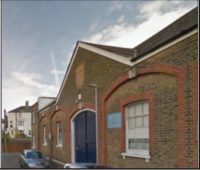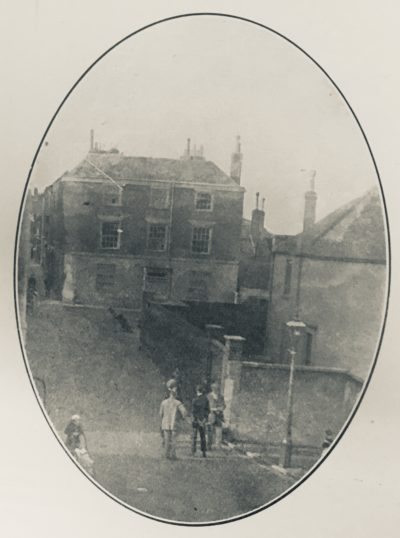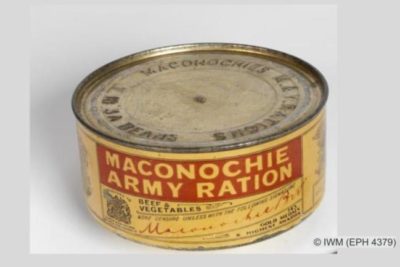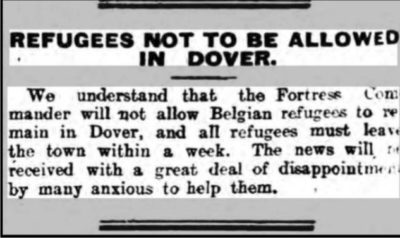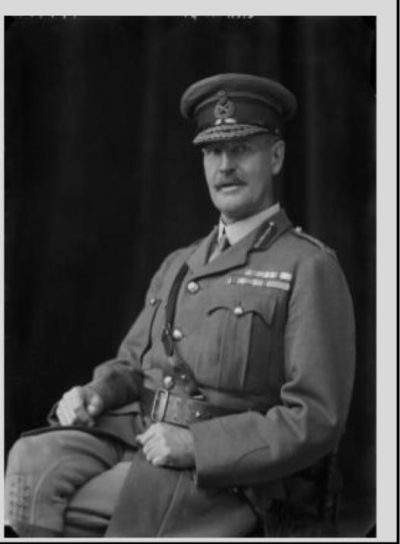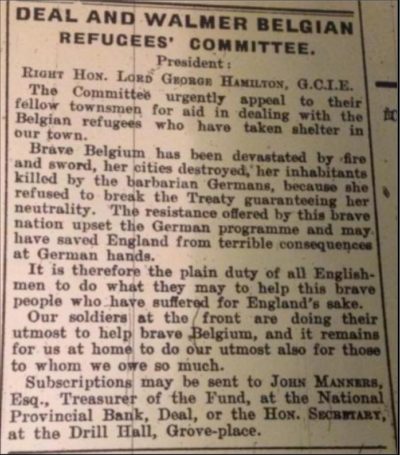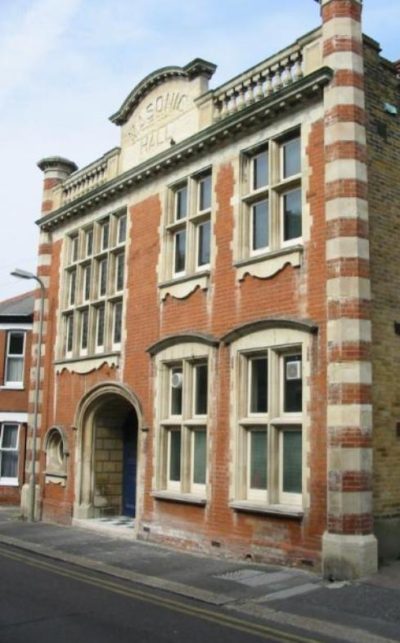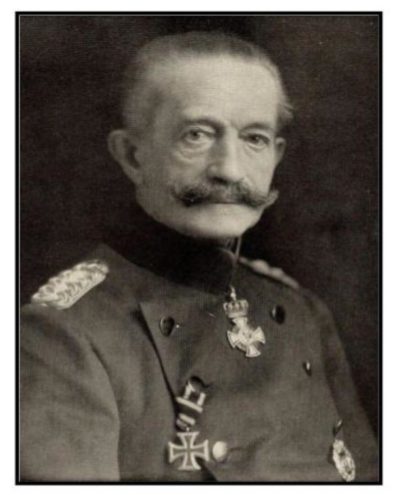Refugees Arrive in Deal
At the time Charles Hussey received the call for help nothing was ready in Deal for a sudden influx of refugees and their immediate needs. Before their arrival, a building of sufficient size was quickly looked for and the Drill Hall in Hope Road was decided upon.
Our Alost witness says that they travelled to Deal by train and were then met at the station by Mrs Hussey and several other ladies who took them to the Drill Hall. On arrival at the hall, he says Mayor Hussey and the ladies worked tirelessly to provide whatever assistance that they could. Many of them did not know what would happen next. He says he spent his first night in the Drill Hall with the other refugees and the next day he saw Mrs Hussey and her fellow volunteers allocating and finding places for them all to stay.
An extract from 1914-1915 Our Stay in Deal & Walmer tells that
“… some poor people living in Mill Road and other localities received into their homes strangers as their guests, sharing with them the fruits of their daily toil- proof of the admirable fellowship existing among the poor whose modest sacrifices are often ignored….”
Those that could afford to pay were found apartments, houses or rooms in lodging houses. The Town’s Corporation had purchased several houses including Royston House, allowed these to be used to house Belgian Refugees before they moved on. The houses were then used by Scottish troops and Orient House was used as a club for the wounded soldiers from the various hospitals in the town. Those who could not be often placed in local people’s homes for which the Committee’s fundraising eventually paid for.
Over the next weeks, hundreds of refugees were to arrive all needing food, clothing, care and accommodation.
The trustees of Wesley Hall and the Congregational Church, of Deal, also gave over their premises as dormitories and meeting places to those who were to arrive over the coming weeks.
Townspeople helped by providing bedding, food and clothing. Alderman Edgar even sent a hundredweight of bones from which to make soup.
Alderman James Edgar owned the meat packing factory in Deal that eventually went on to pack the Government Maconochie rations.
After food and a place to stay, money would have been the next concern, and for those that did have it, Mayor Hussey assisted with its exchange. He also helped the refugees to register with the Police in accordance with the Aliens Restriction Order. A Sergeant Ashby even attended the Drill Hall itself to assist with this.
It was not until 21 October that the Deal & Walmer Refugee Relief Committee was formed to take over the official provision of food, lodging and care of the refugees.
At the end of 1914 a central register was in place and all refugees, over sixteen years of age, received and had to carry a certificate of registration.
Restrictions
On the 21 October, the Home Office announced it was “inadvisable to send Belgian Refugees to the eastern and Southeastern coastal towns”. Luckily for our refugees, and others in the now restricted areas, it was decided they could stay if they had already gained permission to do so from the local police.
On the 23 October General Crampton, Fortress Commander of Dover issued an order which was publicised in the Dover Express stating that all foreigners should be excluded from Dover.
On the 21 October, the Home Office announced it was “inadvisable to send Belgian Refugees to the eastern and Southeastern coastal towns”. Luckily for our refugees, and others in the now restricted areas, it was decided they could stay if they had already gained permission to do so from the local police.
On the 23 October General Crampton, Fortress Commander of Dover issued an order which was publicised in the Dover Express stating that all foreigners should be excluded from Dover.
Appeals for Help
At the end of October 1914, an appeal was placed in the local paper. There were many other such appeals, followed by fundraising activities most of which were reported on in the newspaper. Recognising the town couldn’t be expected to raise all the funds necessary to care for the refugees Mayor Hussey made an application to the Local Government Board for financial assistance. This really was needed as an eventual twelve to fifteen hundred refugees were eventually fed, housed and cared for in Deal and Walmer.
The curate of St.Thomas’ church in Deal, the Reverend Father Anthony Limpens and a fellow Belgian, also sprang into action. Since the arrival of the Belgians, who were mainly Catholic, he undertook to read out from the pulpit after each service the names of those for whom letters had reached the town but whose addresses were not known to the writers.
He gave over his home as a storeroom for donated items of clothing which he then distributed to those in need. He also gathered a large quantity of wool and gave it the Belgian women who wanted to knit items for the troops fighting in Flanders. A Mrs Hills of Deal suggested a weekly working party to produce ‘much-needed comforts’ for soldiers and refugees alike, as well as items of embroidery and needlework. She opened up her home to a group of 20 or so Belgian ladies to meet, take tea and talk while producing these necessities. An exhibition and sale of their work took place in Deals Masonic Hall which earned itself a write up in the local newspaper including, on this occasion, the names of some of the Belgian ladies themselves.
Belgian Ladies Patriotic Work Exhibition at The Masonic Hall.
“Some very beautiful examples of artistic needlework …were on view at the Masonic Hall on Wednesday 19th May 1915………………… Among the stall holders were ………
Mesdammes Herssens, Ruyssen, Dupont, Versmeerch, Mdlles. Jaquemain, Van Uxem, Vandershuren, and little Mdlle. Versmeerch.”
Belgium
The Belgian men also gathered together at Mangilli’s Restaurant, which was on the site of present-day Dunkerly’s restaurant, to form a local branch of the Franco-Belge Committee. This international committee was first formed in October 1914 in London to give information, advice, recommend fellow refugees to other societies and committees and also to try and find them employment and here in Deal it was no different.
Whilst here the refugees took a close interest in what was happening in their homeland mainly through the exiled Belgian press. The’Moniteur Belge’ was the official Belgian government newspaper during WW1. It may have been in this newspaper that our refugees read about the decree, made on 15 January 1915 by Moritz von Bissing the Governor General of occupied Belgium. This imposed a tax on the Belgian people at six times the rate of 1914. Where ever they heard about it they decided to write a letter to the Belgian Minister of Foreign Affairs, protesting against this tax. This was sent to the exiled government in Le Harve and suggested they appeal to the neutral countries “to intervene to end this violation”. They also protested about the extra ten percent penalty that was to be imposed on those that had fled Belgium if they did not return before 01 March 1915. The extra ten percent tax was mainly aimed at those who had fled to Holland in an attempt to get the much-needed workforce to return.
One refugee family who came to Deal did return to Alost. Who they were or if their return was due to the decree is unknown but on arrival, they found their home was occupied by a German officer who was using their drawing room to pass judgements on ‘guilty’ Belgians.
